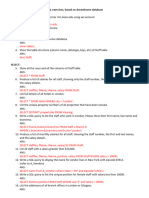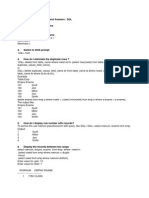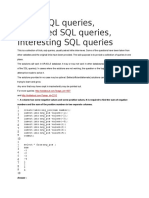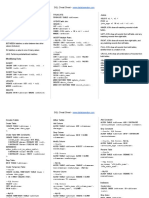SQL Basics Cheat Sheet A3
Uploaded by
ABHINEET KojiamaSQL Basics Cheat Sheet A3
Uploaded by
ABHINEET KojiamaSQL Basics Cheat Sheet
SQL, or Structured Query Language, is a language to talk to FULL JOIN
databases. It allows you to select specific data and to build FILTERING THE OUTPUT QUERYING MULTIPLE TABLES
FULL JOIN (or explicitly FULL OUTER JOIN) returns all rows
complex reports. Today, SQL is a universal language of data. It is COMPARISON OPERATORS INNER JOIN from both tables – if there's no matching row in the second table,
used in practically all technologies that process data. Fetch names of cities that have a rating above 3: JOIN (or explicitly INNER JOIN) returns rows that have NULLs are returned.
SELECT name matching values in both tables. SELECT city.name, country.name
SAMPLE DATA FROM city
WHERE rating > 3;
SELECT city.name, country.name
FROM city
FROM city
FULL [OUTER] JOIN country
COUNTRY [INNER] JOIN country ON city.country_id = country.id;
id name population area ON city.country_id = country.id; CITY COUNTRY
CITY COUNTRY id name country_id id name
1 France 66600000 640680 Fetch names of cities that are neither Berlin nor Madrid: id name country_id id name 1 Paris 1 1 France
2 Germany 80700000 357000 SELECT name 1 Paris 1 1 France 2 Berlin 2 2 Germany
... ... ... ... FROM city 2 Berlin 2 2 Germany 3 Warsaw 4 NULL NULL
WHERE name != 'Berlin'
3 Warsaw 4 3 Iceland NULL NULL NULL 3 Iceland
CITY AND name != 'Madrid';
id name country_id population rating
1 Paris 1 2243000 5
2 Berlin 2 3460000 3
TEXT OPERATORS
... ... ... ... ... Fetch names of cities that start with a 'P' or end with an 's': CROSS JOIN
SELECT name CROSS JOIN returns all possible combinations of rows from
FROM city LEFT JOIN
QUERYING SINGLE TABLE WHERE name LIKE 'P%' LEFT JOIN returns all rows from the left table with
both tables. There are two syntaxes available.
SELECT city.name, country.name
Fetch all columns from the country table: OR name LIKE '%s'; corresponding rows from the right table. If there's no matching FROM city
SELECT * row, NULLs are returned as values from the second table. CROSS JOIN country;
FROM country; SELECT city.name, country.name
FROM city SELECT city.name, country.name
Fetch id and name columns from the city table: Fetch names of cities that start with any letter followed by 'ublin' LEFT JOIN country FROM city, country;
SELECT id, name (like Dublin in Ireland or Lublin in Poland): ON city.country_id = country.id; CITY COUNTRY
FROM city; SELECT name CITY COUNTRY id name country_id id name
FROM city
id name country_id id name 1 Paris 1 1 France
Fetch city names sorted by the rating column in the default WHERE name LIKE '_ublin';
1 Paris 1 1 France 1 Paris 1 2 Germany
ASCending order: 2 Berlin 2 2 Germany 2 Berlin 2 1 France
SELECT name 3 Warsaw 4 NULL NULL 2 Berlin 2 2 Germany
FROM city
ORDER BY rating [ASC]; OTHER OPERATORS
Fetch names of cities that have a population between 500K and
Fetch city names sorted by the rating column in the 5M:
DESCending order: SELECT name
SELECT name FROM city NATURAL JOIN
FROM city WHERE population BETWEEN 500000 AND 5000000;
NATURAL JOIN will join tables by all columns with the same
ORDER BY rating DESC;
RIGHT JOIN name.
RIGHT JOIN returns all rows from the right table with SELECT city.name, country.name
ALIASES Fetch names of cities that don't miss a rating value:
corresponding rows from the left table. If there's no matching
row, NULLs are returned as values from the left table.
FROM city
NATURAL JOIN country;
COLUMNS SELECT name
SELECT city.name, country.name CITY COUNTRY
FROM city
SELECT name AS city_name FROM city country_id id name name id
WHERE rating IS NOT NULL;
FROM city; RIGHT JOIN country 6 6 San Marino San Marino 6
ON city.country_id = country.id; 7 7 Vatican City Vatican City 7
TABLES CITY COUNTRY 5 9 Greece Greece 9
id name country_id id name 10 11 Monaco Monaco 10
SELECT co.name, ci.name Fetch names of cities that are in countries with IDs 1, 4, 7, or 8:
1 Paris 1 1 France
FROM city AS ci SELECT name NATURAL JOIN used these columns to match rows:
JOIN country AS co FROM city 2 Berlin 2 2 Germany city.id, city.name, country.id, country.name.
ON ci.country_id = co.id; WHERE country_id IN (1, 4, 7, 8); NULL NULL NULL 3 Iceland NATURAL JOIN is very rarely used in practice.
AGGREGATION AND GROUPING SUBQUERIES SET OPERATIONS
GROUP BY groups together rows that have the same values in specified columns. It A subquery is a query that is nested inside another query, or inside another subquery. Set operations are used to combine the results of two or more queries into a single result.
computes summaries (aggregates) for each unique combination of values. There are different types of subqueries. The combined queries must return the same number of columns and compatible data
CITY types. The names of the corresponding columns can be different.
id name country_id
1 Paris 1
CITY
SINGLE VALUE CYCLING SKATING
101 Marseille 1 The simplest subquery returns exactly one column and exactly one row. It can be used
country_id count id name country id name country
102 Lyon 1 with comparison operators =, <, <=, >, or >=.
1 3 This query finds cities with the same rating as Paris: 1 YK DE 1 YK DE
2 Berlin 2 SELECT name
2 3 2 ZG DE 2 DF DE
103 Hamburg 2 FROM city
4 2 3 WT PL 3 AK PL
104 Munich 2 WHERE rating = (
SELECT rating ... ... ... ... ... ...
3 Warsaw 4 FROM city
105 Cracow 4 WHERE name = 'Paris'
);
UNION
UNION combines the results of two result sets and removes duplicates. UNION ALL
AGGREGATE FUNCTIONS doesn't remove duplicate rows.
avg(expr) − average value for rows within the group
count(expr) − count of values for rows within the group
MULTIPLE VALUES This query displays German cyclists together with German skaters:
max(expr) − maximum value within the group A subquery can also return multiple columns or multiple rows. Such subqueries can be SELECT name
min(expr) − minimum value within the group used with operators IN, EXISTS, ALL, or ANY. FROM cycling
sum(expr) − sum of values within the group This query finds cities in countries that have a population above 20M: WHERE country = 'DE'
SELECT name UNION / UNION ALL
FROM city SELECT name
WHERE country_id IN ( FROM skating
EXAMPLE QUERIES SELECT country_id WHERE country = 'DE';
Find out the number of cities:
FROM country
SELECT COUNT(*)
WHERE population > 20000000
FROM city;
);
INTERSECT
INTERSECT returns only rows that appear in both result sets.
Find out the number of cities with non-null ratings:
SELECT COUNT(rating) This query displays German cyclists who are also German skaters at the same time:
FROM city; CORRELATED
SELECT name
A correlated subquery refers to the tables introduced in the outer query. A correlated
FROM cycling
subquery depends on the outer query. It cannot be run independently from the outer
WHERE country = 'DE'
Find out the number of distinctive country values: query.
INTERSECT
SELECT COUNT(DISTINCT country_id) This query finds cities with a population greater than the average population in the
SELECT name
FROM city; country:
FROM skating
SELECT *
WHERE country = 'DE';
FROM city main_city
Find out the smallest and the greatest country populations: WHERE population > (
SELECT MIN(population), MAX(population) SELECT AVG(population)
FROM country; FROM city average_city
WHERE average_city.country_id = main_city.country_id
EXCEPT
EXCEPT returns only the rows that appear in the first result set but do not appear in the
);
second result set.
Find out the total population of cities in respective countries:
SELECT country_id, SUM(population) This query displays German cyclists unless they are also German skaters at the same
FROM city time:
GROUP BY country_id; This query finds countries that have at least one city:
SELECT name
SELECT name
FROM cycling
FROM country
WHERE country = 'DE'
Find out the average rating for cities in respective countries if the average is above 3.0: WHERE EXISTS (
EXCEPT / MINUS
SELECT country_id, AVG(rating) SELECT *
SELECT name
FROM city FROM city
FROM skating
GROUP BY country_id WHERE country_id = country.id
WHERE country = 'DE';
HAVING AVG(rating) > 3.0; );
LearnSQL.com is owned by Vertabelo SA
Try out the interactive SQL Basics course at LearnSQL.com, and check out our other SQL courses. vertabelo.com | CC BY-NC-ND Vertabelo SA
You might also like
- Real-Time Software Design For Embedded Systems - Hassan Gomaa100% (6)Real-Time Software Design For Embedded Systems - Hassan Gomaa1,172 pages
- Radioactivity Revision Question For Edexcel Igcse83% (6)Radioactivity Revision Question For Edexcel Igcse11 pages
- Learn SQL - Queries Cheatsheet - CodecademyNo ratings yetLearn SQL - Queries Cheatsheet - Codecademy5 pages
- Practical SQL Guide For Relational Databases: January 2016No ratings yetPractical SQL Guide For Relational Databases: January 201676 pages
- Data Analysis With SQL: Postgresql Cheat SheetNo ratings yetData Analysis With SQL: Postgresql Cheat Sheet4 pages
- Select Modifying Data: SQL Cheat Sheet - MysqlNo ratings yetSelect Modifying Data: SQL Cheat Sheet - Mysql3 pages
- ADD Add Constraint Alter: Keyword DescriptionNo ratings yetADD Add Constraint Alter: Keyword Description5 pages
- B: O: D: / M: A: + S: - : Precedence: BODMASNo ratings yetB: O: D: / M: A: + S: - : Precedence: BODMAS17 pages
- PL SQL Tuning Using Bulk Binds and CollectsNo ratings yetPL SQL Tuning Using Bulk Binds and Collects6 pages
- Introduction To RDBMS Participant GuideNo ratings yetIntroduction To RDBMS Participant Guide182 pages
- Using Advanced SQL: Department of Information Systems School of Information and TechnologyNo ratings yetUsing Advanced SQL: Department of Information Systems School of Information and Technology30 pages
- I+A Itype Rings: BANK PO Chapterwise Solved Paper REASONIMG 217No ratings yetI+A Itype Rings: BANK PO Chapterwise Solved Paper REASONIMG 2171 page
- Grigoras, Smith, Morrison, Enzinger (2013) Forensic Audio Analysis - Review 2010-2013No ratings yetGrigoras, Smith, Morrison, Enzinger (2013) Forensic Audio Analysis - Review 2010-201328 pages
- WEB Based RF Optimization Tool (2G, 3G) @radnabalak - New Release100% (1)WEB Based RF Optimization Tool (2G, 3G) @radnabalak - New Release29 pages
- H3C MSR 20 Routers Installation Guide (V1.05) - Book PDFNo ratings yetH3C MSR 20 Routers Installation Guide (V1.05) - Book PDF77 pages
- Solidworks Tutorial: Sheetmetal & Assembly ProjectNo ratings yetSolidworks Tutorial: Sheetmetal & Assembly Project41 pages
- Calculation of Effective Enhanced Dynamic Wedge Factors From Segmented Treatment Tables For Symmetric and Asymmetric Photon BeamsNo ratings yetCalculation of Effective Enhanced Dynamic Wedge Factors From Segmented Treatment Tables For Symmetric and Asymmetric Photon Beams8 pages
- Resultant of A Non Concurrent Coplanar Force System. 2 - 2No ratings yetResultant of A Non Concurrent Coplanar Force System. 2 - 29 pages
- Research Guide: Radio Wave Radiation: Submitted byNo ratings yetResearch Guide: Radio Wave Radiation: Submitted by9 pages
- AICE Biology Lab Practical Practice: Microscopy and Cell MeasurementsNo ratings yetAICE Biology Lab Practical Practice: Microscopy and Cell Measurements5 pages
- A B A B A B: Transformation by 2 X 1 MatrixNo ratings yetA B A B A B: Transformation by 2 X 1 Matrix10 pages
- Shopping List Management System Using Inheritance in C++ (1)No ratings yetShopping List Management System Using Inheritance in C++ (1)5 pages
- Getting Started With Imagery and Remote SensingNo ratings yetGetting Started With Imagery and Remote Sensing17 pages

























































































